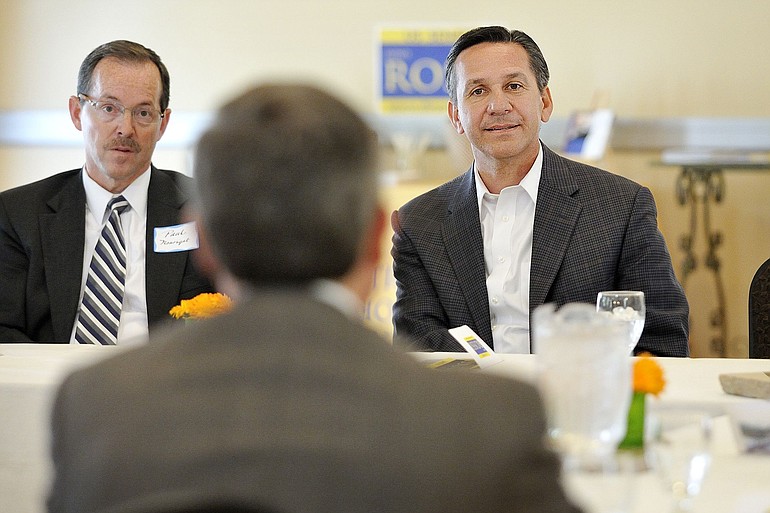Congress should reinstate former President George W. Bush’s tax cuts for wealthy and middle-class Americans when they expire at year’s end and make those cuts permanent, Republican U.S. Senate candidate Dino Rossi said in Vancouver Thursday.
Rossi, who is challenging U.S. Sen. Patty Murray in her bid for a fourth term, has criticized Murray, a Democrat, for supporting the extension of unemployment benefits without voting for offsetting budget cuts of $33 billion to avoid deepening the federal deficit.
“Pay for it,” he told The Columbian editorial board Thursday. “Find ways to pay for it in the budget.”
But he said in an interview that he has no similar concern about paying for the cost of extending the tax cuts Congress approved in 2001 and 2003, during the early years of the Bush administration.
If the tax cuts are allowed to expire, “it will affect jobs in Clark County,” he said. “We should allow people to keep the money they have actually earned.”
A decision about whether to let the tax cuts lapse during the lingering recession is shaping up as the next big battle in Congress.
The nonpartisan Congressional Budget Office said earlier this year that extending the original Bush-era tax reductions would increase budget deficits by $2.56 trillion during this decade. As it stands, deficits under Obama’s budget plan are expected to total $9.75 trillion over the next 10 years.
Rossi, who rocketed to front-runner status among a crowded field of Republican candidates after he entered the race last month, has had a run of good news lately.
He raised $1.4 million in his first month of campaigning.
A Rasmussen Reports poll of likely Washington voters released July 16 showed both Rossi and Tea Party Republican Clint Didier earning 48 percent of the vote to 45 percent for Murray in hypothetical matchups. Fewer than 10 percent of voters in both cases said they preferred some other candidate or were undecided. The poll was the first to show Murray trailing a Republican challenger.
In addition, the staff of the Washington Public Disclosure Commission recommended last week that the commission dismiss the last in a series of complaints filed by Democrats alleging violations of state rules in Rossi’s 2008 campaign for governor.
A former state senator and budget committee chief from King County, Rossi lost to Chris Gregoire in both the 2004 and 2008 gubernatorial races.
Rossi has repeatedly criticized Murray for her use of earmarks to deliver federal largesse to Washington, a practice that Murray vigorously defends. He told The Columbian’s editorial board Thursday, “If it’s worth doing, it’s worth doing through the normal budgeting process.”
He said he’d like to see Congress play a larger role in developing the federal budget and also favors giving the president a line-item veto. “If we can’t change the process,” he said, Congress should swear off earmarks until it produces a balanced budget.
Asked how he would balance the goals of stimulating the economy and reducing the federal deficit, Rossi responded that the stimulus has created only government jobs, not the private-sector jobs that he believes are necessary to an economic recovery.
“You can’t stimulate your way to prosperity,” he said.
As for reducing the deficit, he suggested saving the $270 billion that remains unspent in the stimulus bill, canceling raises for federal employees, and hiring back one federal worker for every two who lose their jobs.
If elected, he said, he would be one of the few U.S. senators “who has signed the front side of a paycheck” and also balanced a state budget without raising taxes.
Earlier in the day, Rossi met with 16 local business leaders at the Hamilton Hall-Red Cross Building at the Fort Vancouver National Site to hear their thoughts about the economy, the local business climate and federal health and financial reform legislation.
But the conversation turned quickly to a discussion of the Columbia River Crossing.
“We want good roads, good transportation, but is this the time to be spending $3 billion?” asked John Bala of Sigma Investment Management. “We’ve spent a huge amount of money just planning for the bridge. The risk, in my mind, is that we end up with a boondoggle of a bridge.”
Lee Rafferty of the Vancouver Downtown Association said her organization favors extension of light rail into downtown as part of the crossing project. The problem for downtown businesses, she said, is uncertainty.
“I own a building that has sat empty for two years,” she said. “We are ready. From where I sit, something needs to get decided. We have two very active ports. We have commuters who need to come and go.”
Paul Nourigat, a vice president at U.S. Bank, said it’s time to set aside provincialism and realize that the Portland-Vancouver metro area is all one mutually dependent region. “The fact that we lack an adequate transportation system” is hindering economic progress, he said.
Rossi said he favors a new bridge, but he took no position on the specifics of how it should be funded. The key issue, he said, is “how much do you get for your money” in terms of increased movement of people, goods and services.
Participants in the round-table discussion also stressed the difficulty small businesses are having getting bank loans.
John Phillips, who owns a custom woodworking and furniture business, said, “Trying to get a loan is like pulling teeth. I maxed out a couple of credit cards to start my business.”
On health reform, Greg Seifert of Biggs Insurance said the bill Congress passed reforms health insurance but fails to control health care costs. “What’s going to be its demise is its cost,” he said, after which he predicted the government will propose a single-payer system.
Rossi said he favors repealing the bill Congress passed this year and opening the business of health coverage to more competition, “as many programs competing for your business as possible.”



